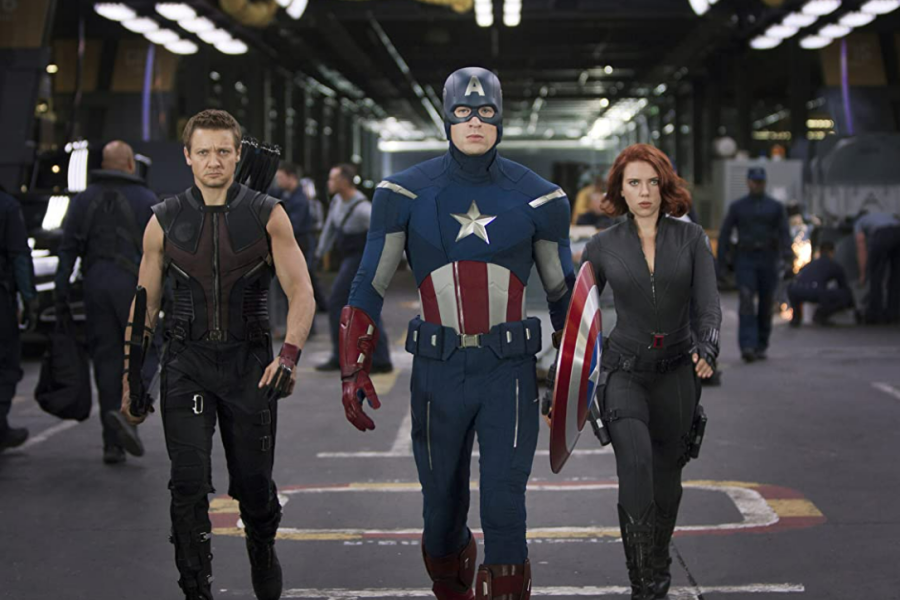Opinion | Superhero stories convey the wrong messages
Chris Evans, Jeremy Renner, and Scarlett Johansson star in “The Avengers” from 2012. Senior columnist Andrew Prozorovsky believes that superhero films lack strong messages to its viewers.
February 15, 2022
First off, no, Thanos is not writing this opinion. I am not a supervillain, nor do I condone supervillain activity. But superheroes, once representing fun, counterfactual universes that developed in comic book niches, have become dull, predictable, invincible figures that befall the same repetitive tropes.
In this day and age, superhero flicks dominate the cinematic world. The film industry is oversaturated by heavily commercialized superhero movies (cough, cough Marvel) delivering similar stories and predictably capitalizing on the same cliches.
And while superhero movies are likely just a collective fad that movie studios have perfected profiting from, perhaps I would be more passively accepting if it weren’t for the fact that superheroes fundamentally teach youth the wrong lessons.
Superheroes don’t teach kids that average Joe is unique and can “save the day” with drive and willpower. First, you have to fall into a vat of chemicals, be extremely wealthy or be an alien from the distant corners of space. Then, as an elitist super, you possess the ability to solve society’s problems with violence.
Additionally, superhero movies provide mixed messages on law enforcement, vigilantism and criminal justice. Society will not reduce crime rates by frightening every mugger with the Bat-Signal. It will reduce crime rates by alleviating the root of the issue: poverty, poor access to education, poor mental health resources and the list goes on. Notice how the list does not include “criminals aren’t beaten enough.”
Get The Daily Illini in your inbox!
Although I would love to say “It depends on the superhero,” the generalizations hold true in almost all cases. A superhero is born of some tragic origin, uses his powers responsibly, never gives up, doesn’t play well with others and his or her superpowers also double as a burden in some capacity.
Only a handful of superhero movies manage to innovate the tedious formula. The superhero films that deserve to be commended include “The Dark Knight” (strong, thematic writing), “Deadpool” (realistically morally ambiguous), “The Incredibles” (illustrates the adverse damages superheroes cause) and “Spiderman: Into the Spiderverse” (effectively plays to comic book nostalgia).
In “The Incredibles 2,” the main villain, Screenslaver, broadcasts their worldview in what manifests to be a quite sobering monologue. Screenslaver argues “Superheroes are part of a brainless desire to replace true desire with simulation. … You want superheroes to protect you, and make yourselves ever more powerless in the process. Well, you tell yourselves you’re being ‘looked after.’ That you’re inches from being served, and your rights are being upheld. So that the system can keep stealing from you, smiling at you all the while.”
Well … Screenslaver isn’t wrong. Superheroes reflect an innate desire to be saved. A desire to experience risk from a comfortable distance. An inability to confront society’s real problems.
And Screenslaver is hardly the first villain to land a sound argument. In “The Dark Knight Rises,” if Bane weren’t so committed to controlling Gotham with a fascistic rule, his populist antagonism toward the corrupt, rich and powerful elite would merit some serious consideration. Other villains are misguided, misunderstood or hypocritical, but more often than not, the villains are written to be more three-dimensional and believable than their perfect, righteous, shallow superhero counterparts.
With all these poor lessons undergirding superhero films, they’re almost irresponsible to consume.
The common argument for superhero films is that they’re purely a medium for entertainment. Maybe these films could be excused for their deficient morals if they weren’t also lazily written. They are full of tropes, plot holes and contradictions. If every Marvel superhero coexists within the same universe, why does Peter Parker have to fight world-ending doom alone? Even with superheroes, the prevalence of “Deus Ex Machina” as a plot device is inexcusable.
Somewhere, there is an argument to be made in defense of superhero movies — that the values imbued in the films include self-sacrifice and courage. But these values are undercut by the storytelling and the distorted standards the “heroes” represent.
Ultimately, they give people hope and provide stress-relieving recreation. Maybe that is enough to justify their existence. Or maybe this age of superheroes is a corporate profit scheme producing the same reskinned story teaching children complacency in the presence of impossibly-exceptional beings.
Whenever I cave to the insurmountable hype and watch the newest superhero motion picture, I am not like Thanos, but rather, more like the Hulk — “I’m always angry.”
Andrew is a senior in LAS.







